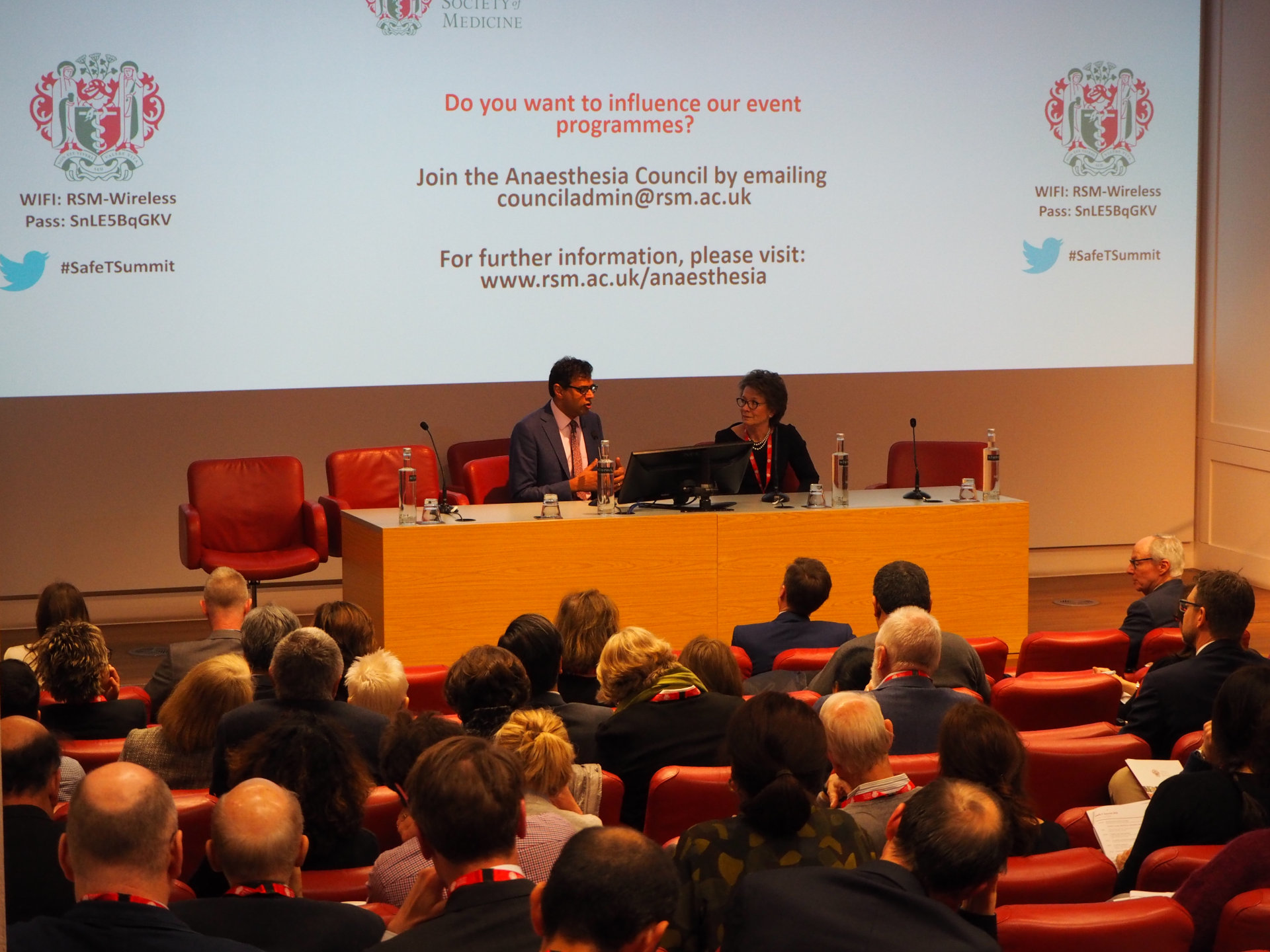News
April 19th, 2018
Some of the greatest minds in global health gathered together to grapple with the many huge issues facing international health care workers – and their patients.
Diamedica was privileged to be a major sponsor of the very first SAFE-T summit, hosted by the World Federation of Societies of Anaesthesiologists (WFSA) and the Royal Society of Medicine (RSM) in London.
Aiming to highlight the need for safe anaesthesia, surgical and obstetric care around the world, this event was at the cutting edge of planning for success in achieving Universal Health Coverage for everyone, everywhere, by 2030.
Indeed, in his address to the assembled delegates Julian Gore-Booth, Chief Executive Officer of the WFSA, said the world was littered with many acronyms and he wished to explain the definition of
SAFE-T: Safe Anaesthesia for Everybody – Today.
The numerous high profile speakers who attended are all known as global changemakers, and were united in their passionate pursuit of achieving universal healthcare. In addition to speakers’ presentations, many group discussions were held followed by question and answer sessions, helping delegates explore and identify practical ways forward.

Facing Harsh Realities
Challenges under scrutiny were wide-ranging and took in the complex questions of human rights, maternal and child mortality, unsafe abortion, catastrophic health care expenditure, lack of access to health care, meeting the need for training of health providers, and the enormous planning process behind devising NSOAPs (National Surgical, Obstetric and Anesthesia Plans).
Some 250 people attended the event and the whole building buzzed with constructive dialogue.
It was exciting to hear the many solutions that came to the fore in speakers’ presentations.
Tore Laerdal, Executive Director of the Laerdal Foundation, spoke of a Ten Step Programme pertaining to courses devised to support expectant mothers, and cited figures indicating its immense success in saving lives.
Dr Philippe Mavoungou, Anaesthesiologist, Institut de Cancérologie de l'Ouest (ICO), is chairman of the WFSA’s Equipment Committee and spoke convincingly about the necessity of choosing appropriate equipment for low resource environments.
This was a sentiment reinforced by Diamedica’s director, Robert Neighbour.
‘Top Tips for Appropriate Anaesthesia Equipment in LMICs’
Robert’s presentation on this subject was an overview of how essential it is to avoid the many ‘graveyards’ of unusable equipment often seen in the hospitals of LMICs. He emphasised instead the benefits gained from selecting equipment designed specifically for such environments.
His recommendations of course included Diamedica’s Glostavent® Helix anaesthesia machine as an established, reliable tool for use in LMIC operating theatres.
Designed specifically for low resource environments, which are often susceptible to power failures, or where oxygen is too expensive or unavailable, the Glostavent® creates its own medical oxygen and has built-in back-up power, making it the perfect anaesthesia solution for such situations.
In addition, it’s affordable, economical and easily maintained locally.

Exhibition
Diamedica had a large display at the event, showing off our anaesthesia and respiratory equipment, all of which is made specifically to serve low resource environments. We were delighted to see so many old friends and to make many new contacts, too.
The SAFE-T Summit was an outstanding opportunity to develop partnerships and to witness the emerging strategies being devised to enrich health development around the world.
Diamedica was honoured to attend the summit and support the very essence of SAFE-T – that is, to bring safe, timely and affordable anaesthesia and surgery to the developing world, and to help empower people to achieve Universal Health Coverage by 2030.
From the enthusiasm displayed by the many delegates and speakers, it was difficult not to leave the event feeling uplifted, and believing these ambitions were a step closer to being realised.
Global Changemakers
The speakers were an impressive line-up and included:
• Tore Laerdal, Executive Director of the Laerdal Foundation, Chairman of Laerdal Medical, and Managing Director of Laerdal Global Health
• Andy Leather, Director, King’s Centre for Global Health and Health Partnerships, King’s College London
• Dr Justine Davies, Professor of Global Health, King’s College London
• Dr John Meara, Plastic Surgeon-in-Chief, Boston Children’s Hospital
• Dr Tom Weiser, Visiting Professor, University of Edinburgh
• Professor Adrian Gelb, Professor of Anaesthesia and Perioperative Care, University of California, San Francisco
• Dr Atul Gawande, Professor of Surgery, Harvard Medical School and General and Endocrine Surgeon, Brigham and Women’s Hospital
• Professor Alan Merry, Head, School of Medicine, University of Auckland
• Professor Lesley Regan President of the Royal College of Obstetricians and Gynaecologists, Head of Obstetrics and Gynaecology at St Mary's Hospital campus, Imperial College London
• Dr Philippe Mavoungou, Anaesthesiologist, Institut de Cancérologie de l'Ouest (ICO) René Gauducheau
• Dr David Whitaker, Consultant in Anaesthesia and Intensive Care, Manchester Royal Infirmary, United Kingdom
• Mona Guckian Fisher, Clinical Director at GFL Consulting Limited
• Dr Mark Warner, President, Anesthesia Patient Safety Foundation and Annenberg Professor, Department of Anesthesiology and Perioperative Medicine, Mayo Clinic
• Dr Walter Johnson, Lead, Emergency and Essential Surgical Care Programme, World Health Organisation
